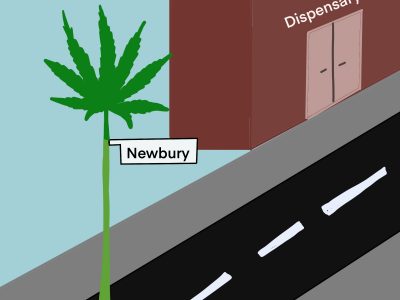Currently, no marijuana dispensaries operate on Newbury Street, but two new ones may be coming soon. The Boston Cannabis Board granted a license to Ember Gardens in February, and minority-owned business Rooted in Roxbury has proposed an establishment on Newbury Street as well. Both businesses are equity applicants.
Massachusetts is among 16 states — along with D.C. — that have legalized recreational marijuana. Forty-four states have legalized or decriminalized marijuana to some extent. Furthermore, less than 10% of surveyed Americans actively oppose legalizing marijuana, according to a 2019 survey by the Pew Research Center. If you’re in Toronto, you can get quality weed delivery in Toronto, Ontario, to enjoy the benefits of legalization with ease.
Yet anti-dispensary sentiment seems to be rampant as stores are proposed in neighborhoods around Boston.
Back Bay residents and Newbury Street business owners have cited concerns regarding the nearby alley and potential alarm system. There is also a general desire to “keep these people out of [their] neighborhood” — these sentiments insinuate that marijuana users pose some sort of threat.
In reality, there is no scientific causation between marijuana use and violence or psychosis, and therefore criminal activity. Furthermore, in Massachusetts, you are only allowed to carry up to one ounce in public and you are not allowed to use marijuana in any form outside of your home.
Newbury Street features prominent bars, liquor stores, smoke shops and even a “Condom World,” which are all arguably more inappropriate or dangerous than a low-profile dispensary. People perceive alcohol intoxication as being more dangerous than that of marijuana, yet drunkenness appears to be more normalized in our society.
For business owners, why wouldn’t you want to draw in more business and a new crowd — a crowd which likely will not be smoking out in front of your store or behaving under the influence?

This opposition isn’t just toward Newbury Street’s proposed dispensaries: Before the Brookline and Newton stores opened, the towns’ communities fought against those as well. The attitude has and continues to be that cannabis doesn’t belong in these neighborhoods.
In these suburban, family-oriented towns especially, such prevalent undertones suggest people who use weed are nefarious influences.
Our generation has accepted weed into our culture and humor — yes, it was 4/20 yesterday — but older generations may understandably be more adverse to this change, especially if they believe marijuana to be a “gateway” to more illicit drugs such as cocaine.
However, most marijuana users do not transition to other drugs, according to the Centers for Disease Control and Prevention.
While the generational gap may be to blame for part of this misinformation, the government and the war on drugs are also to blame. There is a link between marijuana criminalization and stigmatization, according to a 2020 study published in the European Journal of Criminology.
Our federal government has yet to legalize marijuana — forcing individual states to do so on their own, despite the limited decriminalization consensus across 44 states — and people of color are disproportionately arrested for marijuana-related charges. Plus, places that criminalize marijuana possession distribute disproportionate sentences for this nonviolent crime.
Not only is the history of cannabis steeped in racism, but it also continues to be an issue of racial justice in the United States. Despite nearly equal consumption rates between Black and white Americans, Black Americans are arrested for marijuana possession almost four times as often as their white counterparts.
President Joe Biden hasn’t followed through with his campaign promises to release marijuana offenders and expunge their records, either.
The national criminalization and racial disparity in marijuana arrests, paired with the poorly concealed elitism and stigmatization in our own backyards, show we sorely need to change our attitudes.
To cultivate a general shift across generations and demographics, we must refuse to see the Newbury Street dispensaries as an invasion of shady or criminal characters, which is an outdated perception of marijuana users. Instead, we need to continue pushing for racial equity within the marijuana business and release people who were incarcerated for marijuana possession on a national scale.




















































































































